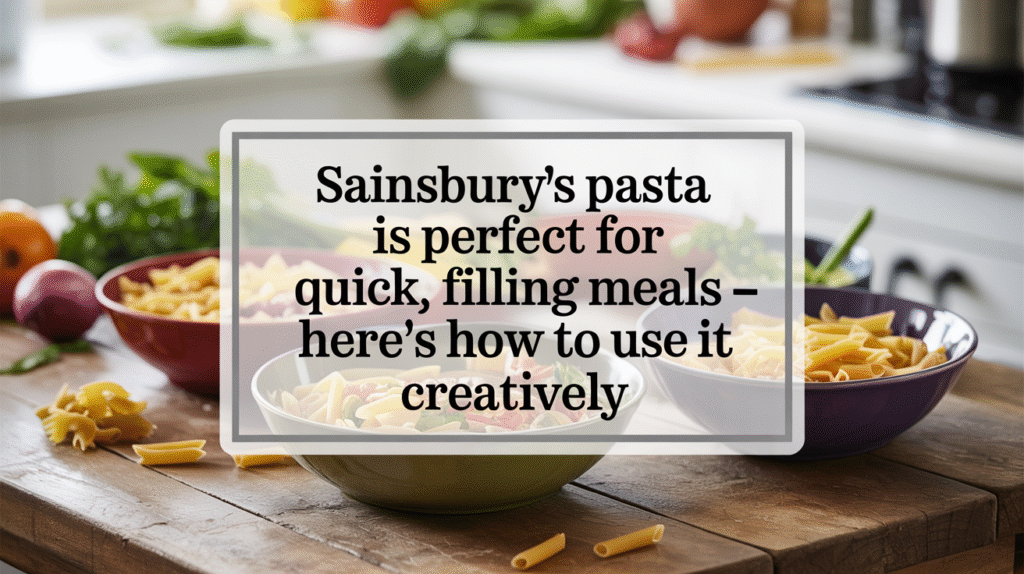Sainsbury’s Pasta offers a reliable, budget-friendly base for countless dishes—from hearty dinners to light summer salads. Whether you prefer penne, fusilli, spaghetti, or tagliatelle, Sainsbury’s wide variety of pasta shapes and types makes it easy to create restaurant-quality meals at home. Their pasta range includes standard wheat pasta, wholewheat options, and gluten-free varieties, making it suitable for nearly every dietary need.

Types of Sainsbury’s Pasta and Their Best Uses
Sainsbury’s offers an extensive selection of pasta, each type suited for specific textures and sauces. Choosing the right one helps your dishes shine.
Short Pasta (Penne, Fusilli, Farfalle)
These shapes are ideal for thick sauces, salads, or oven bakes.
- Penne and rigatoni work well with meaty or creamy sauces.
- Fusilli and farfalle hold onto chunky sauces and dressings for pasta salads.
Long Pasta (Spaghetti, Linguine, Tagliatelle)
Long strands are perfect for oil-based or smooth sauces.
- Spaghetti pairs best with tomato, pesto, or garlic-infused oils.
- Tagliatelle complements rich sauces like carbonara or mushroom cream.
Wholewheat and Gluten-Free Pasta
Great alternatives for those focused on health or dietary restrictions.
- Wholewheat pasta is higher in fibre and has a nuttier taste.
- Gluten-free options made from corn, rice, or quinoa are ideal for coeliac diets.
Why Sainsbury’s Pasta Is a Pantry Staple
From convenience to variety, Sainsbury’s pasta delivers on every front.
Affordable and Accessible
Sainsbury’s offers pasta in various price ranges without compromising on quality.
- Standard ranges are excellent for everyday meals.
- Taste the Difference pasta line offers premium Italian-style pasta.
Clear Labelling and Cooking Instructions
All packs come with clear guidance, making preparation foolproof.
- Cooking times help avoid overcooking or undercooking.
- Nutrition labels assist in meal planning and calorie control.
How to Cook Sainsbury’s Pasta for Best Results
Proper preparation ensures your pasta turns out al dente and flavourful.
Use Plenty of Salted Water
Salting the water ensures the pasta is seasoned from within.
- Use at least 1 teaspoon of salt per litre of water.
- Avoid adding oil to the water—it prevents sauces from sticking.
Stir Occasionally and Time It
Stirring prevents clumping, and timing ensures the right texture.
- Check a minute before the lowest recommended time.
- Drain but do not rinse unless preparing a cold salad.
Finish in the Sauce
For added depth, cook pasta in the sauce for the last minute or two.
- Helps the sauce bind better to the pasta.
- Enhances flavour absorption.
Delicious Meals You Can Make with Sainsbury’s Pasta
Pasta is endlessly adaptable and works for simple or elaborate dishes.
One-Pot Pasta Meals
Perfect for busy weeknights with minimal clean-up.
- Combine pasta with stock, vegetables, herbs, and protein.
- Everything cooks in one pan, absorbing all the flavours.
Pasta Bakes and Gratins
These are great for batch-cooking or feeding a family.
- Mix cooked pasta with cheese, vegetables, and sauce, then bake.
- Add breadcrumbs or grated cheese on top for a crispy finish.
Pasta Salads
Ideal for summer meals or meal prep.
- Mix cooked pasta with olives, cherry tomatoes, cucumber, and dressing.
- Add protein like tuna, chicken, or boiled eggs.
Classic Sauces to Pair With Sainsbury’s Pasta
Pairing the right sauce enhances both the taste and mouthfeel.
- Tomato-based: marinara, arrabbiata, or Bolognese.
- Cream-based: Alfredo, carbonara, or mushroom.
- Oil-based: aglio e olio or pesto.
How to Store and Use Leftover Pasta
Proper storage helps you avoid waste and enjoy pasta later.
Refrigerate or Freeze
Store cooked pasta in an airtight container for up to 3 days.
- Add a splash of olive oil before storing to prevent sticking.
- Freeze individual portions with sauce for easy reheat meals.
Reheat Gently
Avoid drying out the pasta during reheating.
- Reheat with a splash of water or broth to restore moisture.
- Microwaving works well, but stovetop reheating maintains texture.
FAQs
Here are some questions and answers about Sainsbury’s Pasta.
What’s the difference between regular and wholewheat pasta?
Wholewheat pasta contains more fibre and nutrients because it retains the bran and germ. It also has a slightly nuttier flavour and firmer texture than standard white pasta.
Can I freeze cooked pasta?
Yes, cooked pasta freezes well. Cool it first, store in portions, and freeze with or without sauce. Use within one month for best taste.
Does Sainsbury’s offer vegan-friendly pasta?
Yes, most Sainsbury’s dry pasta options, including spaghetti and penne, are made only from durum wheat and water, making them naturally vegan.
How do I stop pasta from sticking?
Use plenty of boiling water, stir occasionally, and avoid rinsing after draining (unless using in cold salads). Adding sauce immediately also helps prevent sticking.
Is gluten-free pasta from Sainsbury’s good for baking?
Yes, Sainsbury’s gluten-free pasta holds up well in baked dishes. Cook it slightly under before baking to avoid mushiness.
Sainsbury’s Pasta is a versatile, budget-friendly essential that adapts to every type of dish—from quick lunches to comforting casseroles. With the right type and cooking technique, you can enjoy endless pasta possibilities that are simple, satisfying, and nutritious.
